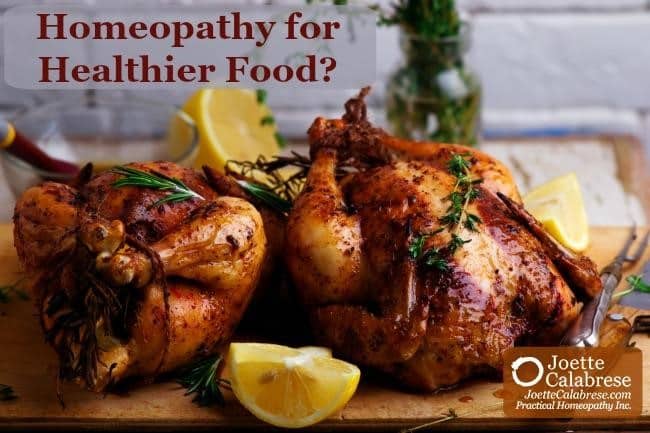
As we sit down to our family feasts during the holidays, many of us say grace, thanking God for the bounty.
Occasionally, I save a small measure of thanks for homeopathy as well.
We spend so much time in my blogs and courses discussing homeopathy’s role in human health, sometimes I forget to impress upon you how very helpful homeopathy can be in animal health, too.
And I’m not just talking about Buster, the Bad Office Dog here; I’m talking about turkeys, chickens, Cornish hens or, as 007 might say, “Birds … Meat Birds.”
A client of mine shared this success story with me:
“This year we raised our own Cornish-cross meat birds for chicken.
They're notoriously weak in the heart because of being overbred to grow super-fast. We used Arnica 200 in their water for healing some injuries early on in their lives, and when we saw how active and healthy they were, we continued with Arnica 30 in their water indefinitely. My husband butchered the birds today, and their organ meats were the healthiest we've seen in any chickens we've raised — nice, big and rich, dark red. It will now be standard to give our meat birds Arnica!”
Isn’t that remarkable?
To be able to observe the internal organs of a homeopathically-treated animal is unarguably confirmation for the use of this medicine — especially when the radical difference is noted by folks who raise animals for food and who have first-hand knowledge of organs’ appearance without homeopathy.
I have had my own experience with treating food animals homeopathically. In fact, I wrote about it for Homeopathy Today (you might enjoy reading the entire article here).
Years ago, I was raising chickens for eggs. One of the flock suddenly began walking funny and within three hours — after experiencing diarrhea, vomiting and tremors — she was dead!
I mistakenly assumed she must have been poisoned. (Our free-range chickens occasionally took their freedom so seriously they would wander off of our property where, unfortunately, our neighbor put out arsenic to kill barn rats.)
Two days later, another chicken died in the same way. I had given the bird the homeopathic remedy for poison (Arsenicum album), but it had done nothing.
It wasn’t homeopathy’s fault. I had given the bird the wrong remedy because my assumption had obviously been wrong.
You know all too well I now teach the importance of diagnosis when treating anyone (or anything) with homeopathic medicines.
So, I called a veterinarian friend who told me it sounded like fowl cholera — a devastating disease to a flock, as it carries with it roughly a 50% mortality rate and those chickens who survived often stop laying eggs.
My heart sank as two more birds became ill.
They were not only important to us for the food they provided, but they were also little members of our family.
This disease was fast-moving, and I knew these two birds, Gloria and Gladys, had very little time. I quickly looked up cholera in my repertory (human cholera, because there was no time to find a specific remedy for fowl cholera).
Cuprum metallicum 30C was the standout choice because one of its hallmarks is stiffness of the extremities. (Remember I mentioned they began walking funny before the more severe symptoms set in?)
I administered the Cuprum right into each of the ladies’ little beaks.
Within three minutes, Gloria was sitting up again.
Within five minutes, she was walking. Gladys was pecking at the floor (an encouraging sign for chickens … although probably not a good thing if you observe it in a human patient).
They both made a full recovery.
Realizing this was likely an epidemic, I gave the entire flock Cuprum metallicum prophylactically, administering the medicine to each bird individually —beak by beak.
I certainly could have put one dose into the water in the coop, thereby delivering it to them all at once.
But truth be told, it felt more consoling to treat each one while reassuring them (and myself) everything would be just fine.
We have not lost another chicken to disease since then.
So, having experienced that in my own life, I completely believed my client’s success with her Cornish-cross meat birds even before learning their internal organs proved homeopathy’s benefit.
But this story can be convincing evidence for any skeptics around your holiday table (although I am sure any mother worth her salt would insist discussing the butchering of the meal is decidedly not appropriate “table-talk”).
So, as soon as dinner is over, pass on the good news of homeopathy!
Warmly,

P.S. As we embark on a new year, this is the perfect time to resolve to take your family’s health into your own hands by taking my Gateway to Homeopathy: A Guided Study Group Curriculum.
It is an inexpensive yet invaluable way to begin your journey into homeopathy.
Gain the freedom and the empowerment to care for your family — and your animals — when they need you. And build a network of like-minded moms (and dads) to share your successes, grow your experience, knowledge, competence, and confidence.
After all, I’m in the empowering and confidence-building business!
And there's no better time to get started than right now — as a bright, shiny new year begins.




Here is my homeopathy chicken story: my eldest hen Shala (aged 9 years) couldn’t get out of the nesting box/coop. Her legs simply wouldn’t work. She couldn’t stand, let alone walk. Her best chicken friend hovered around her making worried sounds. I gently carried Shala out to the outdoor run, placing her near the food and water. She was able to shuffle around a bit, so I left her to go indoors and research her condition. My search turned up a grim diagnosis: Marek’s virus – a highly contagious viral neoplastic disease in chickens. Caused by an alphaherpesvirus known as ‘Marek’s disease virus’ (MDV) or Gallid alphaherpesvirus 2 (GaHV-2). Apparently there is no cure, and it was likely all my hens were infected – Yikes!
Feeling sad but determined, I poured over some homeopathic veterinary sites and learned that Hypericum has been used to help this condition. With nothing to lose, I diluted one pillule of Hypericum 30C in a small jar of reverse osmosis water and force-fed a dropperful to my hen – it took a few moments to ensure she got the whole dose but she was so offended by being person-handled, she got up and staggered a few steps away!! I couldn’t believe my eyes!
I fed her two more doses over the course of the day. She spent most of her time parked under a shady blueberry bush, and although she favoured a roosting position, she got up and moved around a few times (chasing the salmon berries and sunflower seeds I tossed to her and her feathered friends). By bedtime, and the last dose of remedy, she put up a great fuss and danced around quite a bit. I tucked her in for the night wondering what the next day would bring. Chickens are notorious for not lingering when they are sick – they just drop dead.
As I lifted her out of her nesting box the next morning, she fought vigorously and ran away as soon as I put her down. She has been well since this story took place last June. Hurrah for Homeopathy!! 🙂
Story after story it never stops amazing me. Thanks for sharing.
Titania, I’m interested to know if your chickens with Marek’s disease had strange pupils? I have a chicken that’s only symptom is a strange pupil that looks like an ink splotch.did Hypericum help that?
Would anyone want a flock of chickens with cholera? even if they survived wouldn’t they still have it in their body? Curious…
The chickens that were treated went on to complete recovery and laid eggs as usual for years. Recovery means recovery, not suppression of symptoms.
I’m just curious… Could Cuprum metallicum be helpful for dogs with hip dysplasia?
The best way to know the full capability of a medicine is to find it in your materia medica and read the appropriate section.
We raise meat birds every summer, and two years ago I got rabbits. My rabbits went through a sneezing phase in the winter and then got over it. I wondered if it was the dreaded snuffles (Pasteurella), but they all survived so I didn’t think much of it. The next spring when I got chicks, despite my disinfection efforts, all the chicks started sneezing. That is never a good sign! I did treat them with a variety of homeopathic remedies (Aconite, Allium, Arsenicum), but nothing seemed to stop their sneezing. We did not have any deaths, however, which was a surprise and a relief. The chickens that year were small compared to previous years.
This year I made sure to get the rabbits out of the coop long before the chickens arrived and did a thorough disinfection. Despite my efforts, the chicks all started sneezing again. However, concluding last year that my rabbits likely were carriers for Pasteurella, I had managed to procure a homeopathic Pasteurella nosode, which I gave to both the rabbits and the chicks in water. Again no deaths, but this year the chicks all did stop sneezing and achieved the desired weight. Good news!
When we lived in the country we had a wonderful goose named Susanna, one day Susanna was attacked by small pack of dogs. When I ran out the dogs took off, but poor Susanna was bleeding…I ran back to the house and got the Arnica! The bleeding stopped and her strength returned, because of Arnica she made a full recovery. Arnica has also been the go to remedy when my lovebirds were in a weak condition, after laying an egg Jenny was using her wings like crutches to get around her cage so I put Arnica in her water and soon she was back to normal strength. Love ? homeopathy!
Great story! Thanks for sharing. I want to point out though, that arsenic is not poisonous to chickens, factory farms actually feed it to chickens as an antibiotic and then their manure is used to fertilize farms (usually rice) and contaminates the crop (and us) with arsenic.
And here is the awesomest-ever source for homeopathy and chickens. It is a 1907 US Dept of Agriculture publication titled, “Common-sense Poultry Doctor” and features homeopathic remedies for every imaginable chicken ailment. You see, there was a time when our government advocated for homeopathic medicines even in animals. Here is the link:
https://archive.org/stream/commonsensepoult00robi_0#page/15/mode/1up
Cuprum Met 6c is BP protocol for epilepsy. Do you think it can help to stop future febrile seizures in a child if taken preventatively?